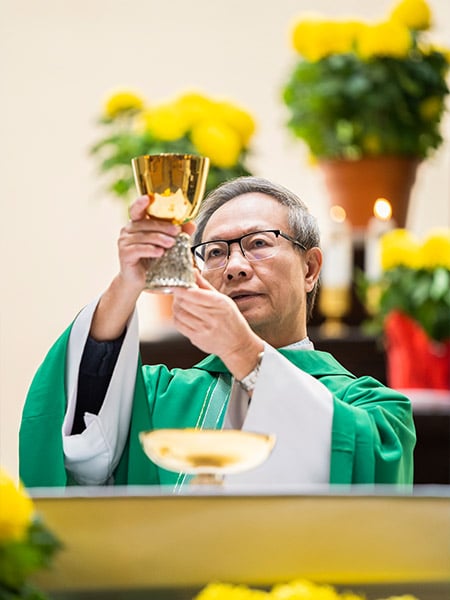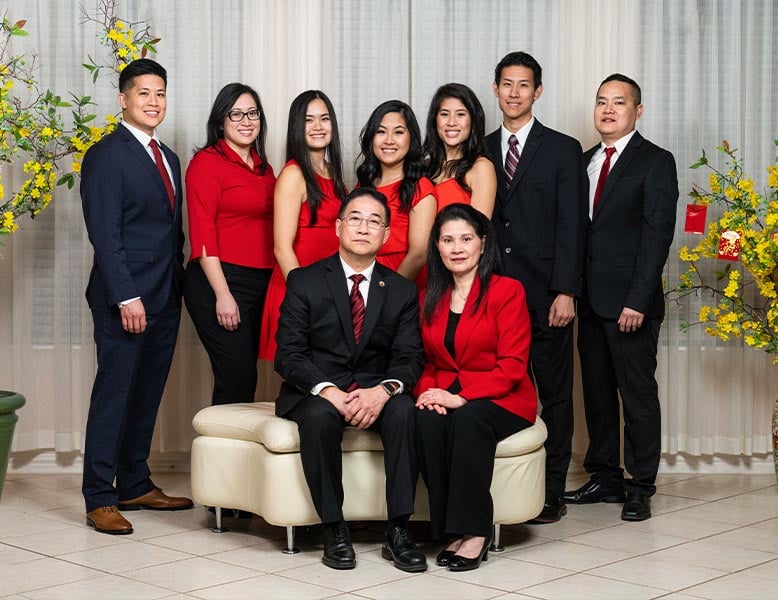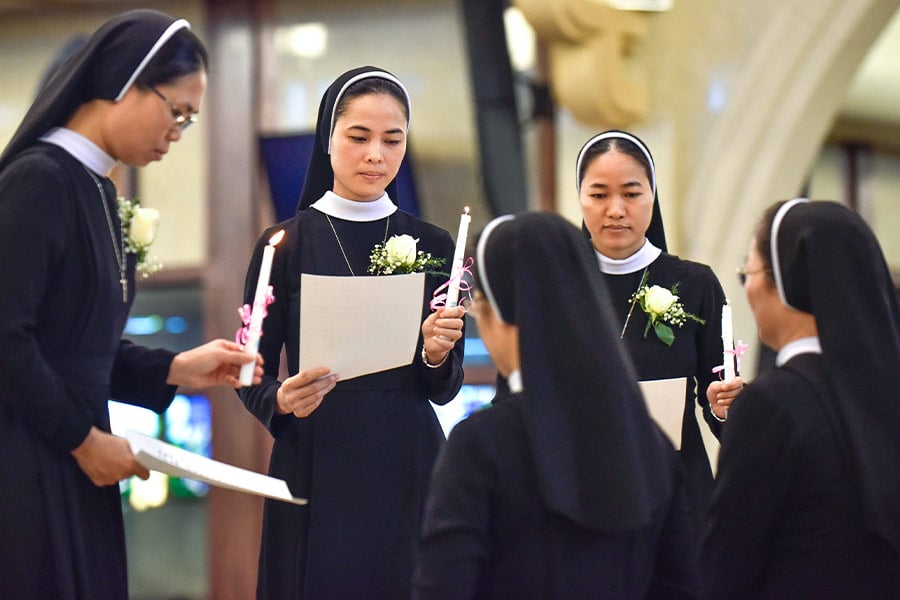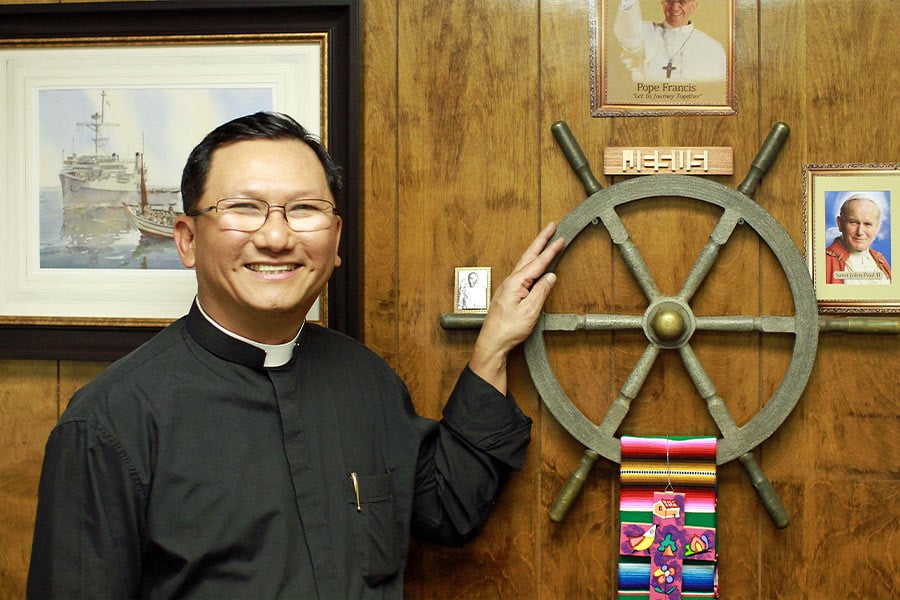A faith enduring persecution - the Vietnamese Catholic community survives and thrives

Hundreds of thousands of Vietnamese Catholics fled the country's communist regime in boats similar to the one pictured here awaiting rescue by the USS Blue Ridge in 1984. (U.S. Navy/James Franzen)
The forceful communist takeover of the South Vietnamese capital of Saigon on April 30, 1975, touched off an exodus of biblical proportions.
During the course of the next two decades, 3 million people from South Vietnam, Cambodia, and Laos fled their homelands, with an estimated 800,000 Vietnamese refugees escaping on boats, according to the United Nations High Commission on Refugees. USA Today has called it “the biggest exodus in peacetime the world has ever seen.”
Tens of thousands of South Vietnamese, unable or unwilling to flee, were systematically killed by the communists or sent off to prisons, otherwise known as “re-education camps.” Some estimates place the number of people who died in captivity at 165,000.
Those on the communist hit list were people aligned with the South Vietnamese government, those who supported United States military forces, and faithful Catholics. All were considered threats to the North Vietnamese invaders who were intent on “unifying” the nation under their rule.
One of the refugees who escaped by boat in 1979 was a 16-year-old boy who, 14 years later, would become a Diocese of Fort Worth priest: Father Hoa Nguyen, pastor of Holy Family Parish in Fort Worth. Like so many of his fellow countrymen in South Vietnam, Fr. Nguyen has always placed Christ and the Catholic Church at the center of his life. This tradition in faith started long ago in Vietnam and has strengthened Christ’s Church in the United States and throughout the world.
“The faithful in Vietnam grew up in a persecuted country,” said Fr. Nguyen. “Between 1700 and 1800, the total number of Vietnamese Catholics was about 200,000. [During persecutions in the 19th century] about 130,000 were executed — more than half.
“We grew out of that persecution throughout history. And during the Vietnam War, it was chaos for Vietnamese Catholics. Communism and Catholicism never matched.”
To preserve their lives and protect their faith, Vietnamese Catholics remained on the move.
“That’s why Catholics in Vietnam had to live together by forming our own communities,” Fr. Nguyen continued. Those communities, he explained, were always formed around the Catholic Church.
“Even in our own land, the Vietnamese people moved from north to south and had to make their own community. They built a church and more Catholics would move there and try to have their home around the church,” the priest explained.
Strengthening Christ’s Church in North Texas
When the persecuted Catholics arrived in North Texas and elsewhere in the United States, spirits rose and their faith flourished.
“The Vietnamese Catholic community excelled,” said Fr. Nguyen. “God always works in that way. In times of persecution and oppression, people preserve their faith and survive. When the time is right, the power of God is released.”
Fr. Nguyen likened the unleashing of the power of God to the tireless work of Saint Pope John Paul II. While pope, he stood strongly against communist oppression of the faithful in Poland and elsewhere. More than 40 years ago, his work, his example, and his words helped restore religious freedom in Poland and bring down communism in other parts of Europe.
“It was like that when the Vietnamese people came to this country,” Fr. Nguyen said.
Helping Catholicism grow in North Texas has been a major contribution of the refugees who arrived here with unshakeable faith, Fr. Nguyen said.
Four predominantly Vietnamese parishes are now part of the Diocese of Fort Worth. They include a total of more than 3,000 families at Immaculate Conception of Mary Parish in Wichita Falls; Christ the King Parish and Our Lady of Fatima Parish in Fort Worth; and Vietnamese Martyrs Parish in Arlington.

These parishes are staffed by Vietnamese priests from the Congregation of the Mother of the Redeemer (CRM), formerly named the Congregation of the Mother Co-Redemptrix. In all, 10 CRM priests serve in the Diocese of Fort Worth.
One of them is Father Jim Khoi, CRM, pastor of Immaculate Conception of Mary.
In 1975, Fr. Khoi was among 170 of the order’s priests and brothers summoned for an emergency meeting with the order’s founder, Father Dominic Tran Dinh Thu. Fr. Dominic told the men to prepare for escape as the communists moved ever closer to the takeover of Saigon and all of South Vietnam.
“He told us about a plan to leave Vietnam,” said Fr. Khoi, who was a brother at the time. “He said he did not know where we would end up, but he entrusted us with a mission — to maintain and expand our order and to evangelize.”
The religious order men would ultimately honor their founder’s wishes in a big way, but not before enduring many trials and tribulations.
Shortly after their meeting with the founder, the 170 men followed through on an escape plan and boarded five already overcrowded fishing boats and set off into the South China Sea. The date was April 30, 1975 — the same day the United States evacuated its embassy in Saigon.
“We sailed out into the ocean,” Fr. Khoi said, “but we did not know where we were going. We did not even have a destination. We all asked each other where we were headed, and no one had an answer. We just entrusted everything to God.”
During their several days at sea, the escapees prayed for a miracle, and it came in the form of U.S. Navy sailors who spotted them adrift, rescued the now-homeless people, and delivered them to refugee camps in Guam and the Wake Islands in the Western Pacific Ocean. In the following weeks, the priests and brothers were transported by C-130 aircraft to Fort Chaffee in Arkansas and to refugee camps in California and Pennsylvania.
Eventually, the men were reunited in Carthage, Missouri, at a vacant Oblate seminary.
The 170 men, once lost at sea with no destination charted, went on to help form Our Lady of the Assumption provincial house in Carthage, recognized by the Holy See in 1985, and to minister to hundreds of thousands of Vietnamese refugees in the United States.
Today, according to Fr. Khoi, the number of CRM religious order priests has grown to include more than 100 men. They serve Catholics of Vietnamese heritage throughout the United States.
In the Diocese of Fort Worth, the religious order also opened the Holy Family Religious and Retreat Center in Fort Worth. Established five years ago, the facility accommodates the faithful for overnight retreats and serves as a venue for religious events for Catholics throughout Texas and Oklahoma.
Fr. Khoi said that neither he nor his fellow CRM priests and brothers could have imagined where their work would have taken them, but he is not surprised.
“We have always trusted in God’s work and God’s providence. If He wants something to happen, it happens,” Fr. Khoi said.
“We continue to follow our main directives to evangelize and to maintain the charism of our order,” he continued. That charism includes devotion to Mary; proclaiming the Gospel, especially for Vietnamese people and the poor; and to live a consecrated life, following the example of Jesus Christ.
Father Dominic, who helped the religious men gain their freedom, died in Vietnam in 2007, but living on is his directive — to expand the order and to evangelize. The CRM priests and brothers never faltered in their mission.
Keeping Christ at the center of everyday life
Working in strong unison with these priests are several thousand Vietnamese Catholics in the Diocese of Fort Worth who share similar stories of faith and survival.
Among them is Jack Hoang, who left South Vietnam in 1976, after communists occupied his home and forced him to work day and night for them, building roads and laboring at other arduous tasks. Hoang fled his homeland on a small fishing boat with his wife, Nancy, seven months pregnant; brother Michael, who now serves as a deacon at Our Lady of Fatima Parish; as well as more than a dozen others.

Jack and Nancy Hoang, proud parents of seven children (from left): John, Julie, Joyce, Jeannie, Jennifer, Joseph, and James. In addition, they dote on nine grandchildren. (NTC/Juan Guajardo)
After four days and nights at sea, navigating by the stars, the refugees reached Thailand. They lived offshore on their boat for a month, followed by another month in the remote Thai highlands. Through the entire ordeal, they sustained themselves on only meager rations of rice and water.
With the help of the Red Cross, Jack and his family were soon reunited with other family members in the Beaumont, Texas, area.
Fifteen days after their arrival in the United States, Nancy gave birth to the couple’s first child. Jack obtained the necessary education to become an electrical technician, eventually relocating to Fort Worth, where he worked for General Dynamics and Lockheed. A long-time member of Our Lady of Fatima Parish, Jack credits God for his survival and that of his family.
“I know that God helped us,” Jack said. “We might have died on that ocean, but we prayed every day, and God provided for us.”
Jack’s daughter Jennifer added that her mother always stressed the power of prayer. “And when I look at what they went through,” Jennifer said, “that right there is proof enough for me.”
Jack and Nancy were blessed with seven children, now ranging from 23 to 43 years of age, all born in the U.S. The parents ensured that their children would come to know Christ and His teachings.
“Every night we would read parts of the Bible,” Jennifer recalled, “and then my dad would summarize it. And each day he would always relate it to what was going on in our lives. If we had a tough day at school or if you came across situations where you are tempted to steal, or lie, or to disobey, he would summarize parts of the Bible to help us reflect on those situations and how we can change and act in the way God wants us to act.”
To this day, Jennifer said, her father still keeps the faith alive via group emails to family and friends relating the Bible to relevant events of modern times.
“I do it every morning,” Jack said, “because I know that the Bible can help people.”
The Hoang family has remained close and strongly connected with the Church, Jennifer said, crediting her father’s creativity and determination to ensure his children would have a lasting relationship with God.
Evangelization for a new generation
Ensuring that youth understand and remain faithful to Christ can be a challenge for all parents and the Church in general. The Vietnamese community is no exception.
While the early Vietnamese refugees grew ever stronger in faith as a result of their epic struggles to survive and escape oppression, many of their children and grandchildren did not share their experience.

Three sisters, of a group of nine from the Lovers of the Holy Cross order, renew their vows at Vietnamese Martyrs Parish in Arlington Aug. 11, 2019. (NTC/Ben Torres)
At Vietnamese Martyrs Parish, two sisters from the Lovers of the Holy Cross religious order of women in Vietnam are on a mission to bring Vietnamese youth closer to Christ. Sister Theresa Tran serves as director of religious formation and catechesis at the parish, while Sister Maria Chu works as director of religious education. The sisters minister to more than 1,600 families.
Both Sr. Theresa and Sr. Maria were born in Vietnam after the takeover by communists, entered their religious order in Vietnam, and each earned bachelor’s and master’s degrees in the United States. They were assigned by their order to Vietnamese Martyrs in 2017.
The sisters are of a generation between those who struggled to be free of religious oppression and younger generations striving to stay astride of two cultures — Vietnamese and American. What unites them all is faith in Jesus Christ.
“For the older generation,” Sr. Theresa said, “the more they suffered, the more they remained faithful to God. The suffering made them stronger and motivated them to keep their faith and to trust in God. When they came to the United States, they continued to build their relationship with God and continued to grow in their relationship with Jesus Christ.”
In Vietnamese culture, Sr. Theresa explained, families share meals together, pray together, and maintain a strong relationship with God.
“What traditionally has kept families together is their strong Catholic faith,” Sr. Theresa said.
Parents and grandparents from Vietnam have always wanted to maintain that tradition in the United States, she said. “They urge their children to be holy, to be good, to be faithful to their Church. They want them to be involved in the Church.”
For teenagers, honoring those traditions can sometimes be a challenge, said Sr. Theresa, stressing the importance of listening to youngsters and creating programs that keep them engaged with their parents and the Church. The earlier children are involved with their families at their parishes, the better, she said.
“So we do our best to help them to be faithful Catholics,” Sr. Theresa said. “That is our job, our responsibility.”
Sr. Maria agreed and hopes all Catholics will follow the example of the Vietnamese Martyrs. Several groups of these martyrs were persecuted and killed in Vietnam for standing up for their Catholic faith from 1798 to 1861.
The name of the parish in Arlington, where the Lovers of the Holy Cross sisters serve, honors those slain martyrs.
“They lived for God and they died for God,” Sr. Maria said, “and now they teach us how to live out our faith in God.”
A long history in the Diocese of Fort Worth
Fr. Nguyen echoed the same sentiments about the Vietnamese Martyrs and the example they set for the faithful who came after them.
“In Vietnam, our faith was born out of persecution … The blood of the Vietnamese martyrs has granted to us the ability to integrate, to connect, to live, and to survive through our faith.”

Father Hoa Nguyen took turns at the helm of a modest fishing boat that carried 43 refugees to freedom after 31 days adrift on the South China Sea. The steering wheel from the fishing boat was given to him by the ship’s captain in 2012, on Fr. Hoa’s 15 anniversary as a priest. (NTC/Jerry Circelli)
Those faithful endeavors by people of Vietnamese heritage have been occurring for most of the 50 years of the existence of the Diocese of Fort Worth in North Texas. At the same time, the Vietnamese Catholic community has played an important role in the diocese’s rapid growth.
“We are always thankful to the American community for embracing us, and inviting us to be part of the diocese,” said Fr. Nguyen.
“When the American community embraced us, it allowed the Vietnamese to come together to celebrate the Holy Eucharist,” he continued. “And from the Eucharist we were able to form the Church, and the Church has given us the Eucharist.
“That is why today the Vietnamese community in this diocese has become very strong.”
